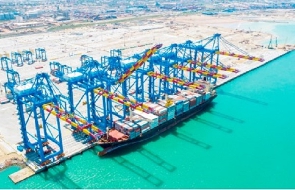The initial challenges of the Integrated Customs Management System (ICUMS) has been reduced by about 70 percent eight months into the introduction of the system.
Mr Emmanuel Ohene, an Assistant Commissioner of Customs in charge of the Accra Sector Command, said the initial delay that users of the system faced when processing bill of entries for example was a thing of the past.
Mr Ohene, who is also the Chairman of the Implementation Team of the Integrated Customs Management System (ICUMS), said it took about two hours to process a pre-manifest declaration once an importer through his or her agent submits documents in ICUMS that were not subject to any queries.
“One of the very attractive modules which is being used by about 70 per cent of the freight forwarders is the pre manifest declaration; it is one of the pillars of trade facilitation agreement from the World Trade Organization. It allows you to process paperwork and make payment prior to the arrival of the vessel,” he explained.
Mr Ohene attributed the success of ICUMS to the decentralization of clearance processes from the Customs Technical Services Bureau.
He said outstations across the various frontiers of the country could manage some of the various customs regimes, including import, export, re export, and transit, among others.
“In a place like Elubo, where we had a lot of complaints, the decentralization has taken place. The same as Aflao,” he said.
Mr Ohene said the initial problem of manifest matching that bedeviled the system was currently non-existent.
He said ICUMS broke down the previous Pre-Arrival Assessment Reporting System (PAARS) and ensured that classification and valuation were done through the ICUMS with a Customs supervisor, who quickly verified documents and generated a tax bill.
This, according to him has “eliminated the multiple routes one had to go through prior to the payment of duties,” which is a hallmark of the ICUMS system.
He said before ICUMS, 141 customs officers across the country that hitherto were operating manually were brought on-board the ICUMS automated systems and by end of first quarter of 2021 all customs offices would be on-boarded.
While admitting to some genuine complaints of the trading public regarding the new system, the Assistant Commissioner of Customs insisted that ICUMS were significantly progressive with regard to trade facilitation in Ghana.
He encouraged users of the system to be hopeful as the ICUMS team plans to soon introduce the second phase of the system, which would see the few challenges fixed as well as many added innovations.
Business News of Sunday, 6 December 2020
Source: GNA













